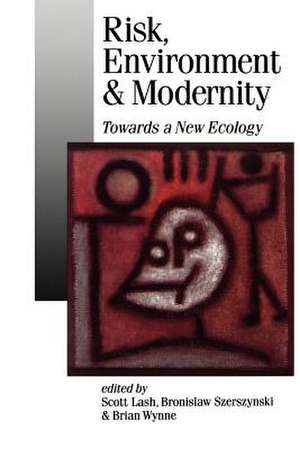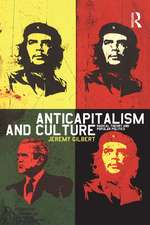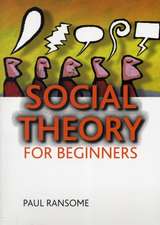Risk, Environment and Modernity: Towards a New Ecology: Published in association with Theory, Culture & Society
Editat de Scott M Lash, Bronislaw Szerszynski, Brian Wynneen Limba Engleză Paperback – 30 ian 1996
Din seria Published in association with Theory, Culture & Society
-
 Preț: 189.83 lei
Preț: 189.83 lei -
 Preț: 444.21 lei
Preț: 444.21 lei -
 Preț: 443.02 lei
Preț: 443.02 lei -
 Preț: 393.44 lei
Preț: 393.44 lei -
 Preț: 280.42 lei
Preț: 280.42 lei -
 Preț: 443.94 lei
Preț: 443.94 lei -
 Preț: 392.73 lei
Preț: 392.73 lei - 8%
 Preț: 445.19 lei
Preț: 445.19 lei -
 Preț: 307.51 lei
Preț: 307.51 lei -
 Preț: 426.59 lei
Preț: 426.59 lei - 22%
 Preț: 372.33 lei
Preț: 372.33 lei -
 Preț: 394.44 lei
Preț: 394.44 lei - 18%
 Preț: 1491.48 lei
Preț: 1491.48 lei - 15%
 Preț: 480.56 lei
Preț: 480.56 lei - 15%
 Preț: 475.52 lei
Preț: 475.52 lei - 15%
 Preț: 486.73 lei
Preț: 486.73 lei - 18%
 Preț: 1364.13 lei
Preț: 1364.13 lei - 18%
 Preț: 1536.08 lei
Preț: 1536.08 lei - 18%
 Preț: 1491.65 lei
Preț: 1491.65 lei - 15%
 Preț: 487.56 lei
Preț: 487.56 lei - 15%
 Preț: 479.46 lei
Preț: 479.46 lei - 15%
 Preț: 479.78 lei
Preț: 479.78 lei - 15%
 Preț: 431.90 lei
Preț: 431.90 lei - 15%
 Preț: 487.05 lei
Preț: 487.05 lei - 18%
 Preț: 1229.47 lei
Preț: 1229.47 lei - 26%
 Preț: 926.68 lei
Preț: 926.68 lei - 18%
 Preț: 1234.14 lei
Preț: 1234.14 lei - 15%
 Preț: 480.44 lei
Preț: 480.44 lei -
 Preț: 479.85 lei
Preț: 479.85 lei - 15%
 Preț: 479.27 lei
Preț: 479.27 lei - 18%
 Preț: 1203.04 lei
Preț: 1203.04 lei - 15%
 Preț: 479.13 lei
Preț: 479.13 lei - 18%
 Preț: 1126.63 lei
Preț: 1126.63 lei - 18%
 Preț: 1234.14 lei
Preț: 1234.14 lei - 15%
 Preț: 478.44 lei
Preț: 478.44 lei - 15%
 Preț: 478.12 lei
Preț: 478.12 lei - 15%
 Preț: 448.04 lei
Preț: 448.04 lei - 18%
 Preț: 1321.90 lei
Preț: 1321.90 lei - 18%
 Preț: 1180.15 lei
Preț: 1180.15 lei - 19%
 Preț: 419.04 lei
Preț: 419.04 lei - 18%
 Preț: 886.71 lei
Preț: 886.71 lei - 18%
 Preț: 1182.37 lei
Preț: 1182.37 lei - 18%
 Preț: 1321.58 lei
Preț: 1321.58 lei - 18%
 Preț: 1074.21 lei
Preț: 1074.21 lei - 15%
 Preț: 428.79 lei
Preț: 428.79 lei -
 Preț: 482.14 lei
Preț: 482.14 lei - 15%
 Preț: 466.03 lei
Preț: 466.03 lei - 18%
 Preț: 1141.40 lei
Preț: 1141.40 lei -
 Preț: 477.89 lei
Preț: 477.89 lei
Preț: 494.50 lei
Preț vechi: 581.76 lei
-15% Nou
Puncte Express: 742
Preț estimativ în valută:
94.63€ • 99.50$ • 78.19£
94.63€ • 99.50$ • 78.19£
Carte tipărită la comandă
Livrare economică 17 aprilie-01 mai
Preluare comenzi: 021 569.72.76
Specificații
ISBN-13: 9780803979383
ISBN-10: 080397938X
Pagini: 304
Ilustrații: 1
Dimensiuni: 156 x 234 x 17 mm
Greutate: 0.44 kg
Ediția:1
Editura: SAGE Publications
Colecția Sage Publications Ltd
Seria Published in association with Theory, Culture & Society
Locul publicării:London, United Kingdom
ISBN-10: 080397938X
Pagini: 304
Ilustrații: 1
Dimensiuni: 156 x 234 x 17 mm
Greutate: 0.44 kg
Ediția:1
Editura: SAGE Publications
Colecția Sage Publications Ltd
Seria Published in association with Theory, Culture & Society
Locul publicării:London, United Kingdom
Recenzii
`This is the strongest edited collection on the relationship between modernity, risk and the environment to be published to date and it deserves a place on the book shelf of every one who takes these issues seriously. Perhaps more importantly this book needs to be read by everyone who thinks that existing responses will ultimately "solve the environmental problem". The editors present the collection as a "slow manifesto" capable of transforming the reductionism and realism they see dominating both natural and social scientific approaches to the environment. In twelve essays, organised into three sections, considerable progress is made towards this ambitious goal. The terrain transversed in the process is intellectually stimulating and demanding but amongst it lie some of the clearest renditions of complex positions currently available.... the overall standard is so consistently high. The reader is provided with an extremely lucid and coherent guide to the terrain covered in the introduction... Summarising the overall argument of a book like this in a short review is inevitably hazardous but I would identify three main themes which are sustained throughout. First, there is a central recognition that empiricism can only provide society with data which in and of itself is no guide to action. Second, the production and interpretation of data is seen as inescapably tied to the normative judgements whether these are supplied by a scientific set of interpretative frames or not. Third, all knowledge needs to be seen as bearing the imprint of the social sites involved in its creation and thus inescapably carries moral, ethical and cultural markers and implications. This may sound like familiar and well rehearsed territory but one of the distinguishing features of this book is that these arguments are offered, not as an assault on empiricism and realism, but as an invitation to address an agenda with the potential to transform the normative use of both these terms.... The slow agenda has however, been eloquently reprised here and contains many sign-posts directing the willing towards fruitful avenues of exploration. This is a book with an important message one can only hope that it is read and widely debated' - Environmental Politics
`This book offers a set of interesting and thought-provoking essays discussing the complex relationship between modernity, environmentalism and the emergence of a risk society... It offers a wide review of relevant literature and is up to date with recent developments in its related fields. Moreover, it has a clear structure and chapters follow `naturally' so that the reader can follow the thread of the arguments presented' - Sociological Research Online
`This book provides a welcome addition to the literature on environment and modernity by collecting papers from key contributors to the debates together in one volume. The wide-ranging subject matter of the papers in the collection should mean that it appeals to an audience beyond those specifically interested in environmental sociology. In this it represents an important move towards establishing discussion of the environment as central to contemporary sociology, rather than being confined to a marginal field of the discipline' - British Journal of Sociology
`This book offers a set of interesting and thought-provoking essays discussing the complex relationship between modernity, environmentalism and the emergence of a risk society... It offers a wide review of relevant literature and is up to date with recent developments in its related fields. Moreover, it has a clear structure and chapters follow `naturally' so that the reader can follow the thread of the arguments presented' - Sociological Research Online
`This book provides a welcome addition to the literature on environment and modernity by collecting papers from key contributors to the debates together in one volume. The wide-ranging subject matter of the papers in the collection should mean that it appeals to an audience beyond those specifically interested in environmental sociology. In this it represents an important move towards establishing discussion of the environment as central to contemporary sociology, rather than being confined to a marginal field of the discipline' - British Journal of Sociology
Cuprins
Introduction - Bronislaw Szerszynski, Scott Lash and Brian Wynne
Ecology, Realism and the Social Sciences
PART ONE: ENVIRONMENT, KNOWLEDGE AND INDETERMINACY: BEYOND MODERNIST ECOLOGY?
Risk Society and Provident State - Ulrich Beck
May the Sheep Safely Graze? A Reflexive View of the Expert-Lay Knowledge Divide - Brian Wynne
Re-vision - Barbara Adam
The Centrality of Time for an Ecological Social Sciences Perspective
On Knowing What to Do - Bronislaw Szerszynski
Environmentalism and the Modern Problematic
PART TWO: RISK AND THE SELF: ENCOUNTERS AND RESPONSES
Life as a Planning Project - Elizabeth Beck-Gernsheim
Individualization at Work - Marco Diani
Occupational Identity and Office Automation
The Tears inside the Stone - John Maguire
Reflections on the Ecology of Fear
Solitary Individualization - Helmuth Berking
The Moral Impact of Cultural Modernization in Late Modernity
PART THREE: THE POLITICS OF THE ENVIRONMENT: EXHAUSTION OR RENEWAL?
The Institutionalization of Environmentalism - Klaus Eder
Ecological Discourse and the Second Transformation of the Public Sphere
The Shaping of the Global Environmental Agenda - Andrew Jamison
The Role of Non-Governmental Organizations
Ecological Modernization as Cultural Politics - Maarten A Hajer
Environmental Knowledge and Public Policy Needs - Robin Grove-White
On Humanising the Research Agenda
Ecology, Realism and the Social Sciences
PART ONE: ENVIRONMENT, KNOWLEDGE AND INDETERMINACY: BEYOND MODERNIST ECOLOGY?
Risk Society and Provident State - Ulrich Beck
May the Sheep Safely Graze? A Reflexive View of the Expert-Lay Knowledge Divide - Brian Wynne
Re-vision - Barbara Adam
The Centrality of Time for an Ecological Social Sciences Perspective
On Knowing What to Do - Bronislaw Szerszynski
Environmentalism and the Modern Problematic
PART TWO: RISK AND THE SELF: ENCOUNTERS AND RESPONSES
Life as a Planning Project - Elizabeth Beck-Gernsheim
Individualization at Work - Marco Diani
Occupational Identity and Office Automation
The Tears inside the Stone - John Maguire
Reflections on the Ecology of Fear
Solitary Individualization - Helmuth Berking
The Moral Impact of Cultural Modernization in Late Modernity
PART THREE: THE POLITICS OF THE ENVIRONMENT: EXHAUSTION OR RENEWAL?
The Institutionalization of Environmentalism - Klaus Eder
Ecological Discourse and the Second Transformation of the Public Sphere
The Shaping of the Global Environmental Agenda - Andrew Jamison
The Role of Non-Governmental Organizations
Ecological Modernization as Cultural Politics - Maarten A Hajer
Environmental Knowledge and Public Policy Needs - Robin Grove-White
On Humanising the Research Agenda
Descriere
This wide-ranging and accessible contribution to the study of risk, ecology and environment helps us to understand the politics of ecology and the place of social theory in making sense of environmental issues. The book provides insights into the complex dynamics of change in `risk societies'.











